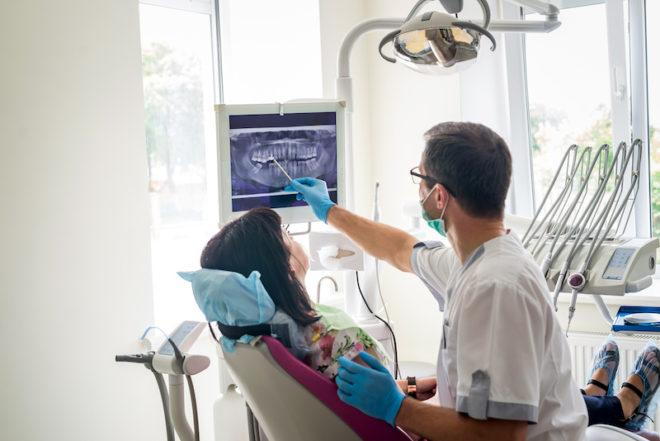
The mouth is made up of the jaw bone, gums, tongue, salivary glands and most importantly, teeth. The purpose of your teeth is to break down food for your stomach to digest, and because they come in direct contact with everything you eat, they require the very best care. Going to the dentist is a critical part of taking good care of your overall health.
There is a wide range of dental problems that could potentially affect people over the long term. These problems often occur as a standalone issue, which can be resolved fairly quickly and easily if a dentist is seen. However, for those who do not see a dentist annually, small problems can easily become big problems, and that is when full mouth reconstruction may become necessary. Sudden mouth trauma can also require a full-mouth reconstruction as well.
What is Full Mouth Reconstruction?
Full mouth reconstruction includes replacing missing teeth, repairing teeth that have been damaged, correction to jaw joints and faulty bites as well as gum and jawbone damage, replacing previous dental work that has worn out, and even treatment for mouth diseases. Each one of these procedures can be performed independently, however, when a person has multiple dental health problems it may be beneficial for a full mouth reconstruction.
Reconstruction is any combination of different types of dentistry to get your mouth back in good health. This could include restorative dental treatments like crowns, bridges, fillings, inlays, and onlays. Implant dentistry uses dental implants to fill in the missing spaces by replicating the originals from root to crown. Cosmetic dentistry works to bring the aesthetics of the mouth back to good health by using porcelain veneers, teeth, whitening, dental bonding, and gum re-contouring.
Neuromuscular dentistry, or TMD treatment, is done to correct any issue that involves the temporomandibular joints as well as the bite. Bruxism treatments include therapy that helps resolve teeth that are grinding. Oral surgery involves root canal therapy, soft and hard tissue grafting and tooth extraction. It can also include other procedures that deal with orthotics and periodontal treatments. Since full mouth reconstruction can be a different combination of these procedures, reconstruction dentistry will look different from patient to patient.
Who Needs Full Mouth Reconstruction?
Anyone who has multiple oral health problems that are affecting the majority of the teeth, as well as the supporting tissue, will oftentimes be the right candidate for the full mouth reconstruction. These oral health issues may include four or more teeth missing or compromised, eroded enamel, decay in multiple teeth, difficulty chewing and biting, bone loss in the jaw, severe difficulty speaking, irritated gums and bones from dentures, or major wear and chipping on the teeth from many years of grinding. There are other conditions that a person can be born with like Ectodermal dysplasia that usually requires a full reconstruction procedure.
Possible Concerns
Patients who are younger tend to respond better to reconstructive treatments and have a quicker recovery time. Those who are older, generally have a greater risk with any type of medical or dental procedure. So, depending on the age and health statics, a less invasive procedure may be a better option.
A full mouth reconstruction is a major process, therefore, those with heart problems or with certain autoimmune diseases require special considerations. Since this is a corrective treatment for better oral health, those who cannot or will not maintain it, due to smoking, heavy alcohol, or drug usage should consider breaking bad habits prior to undergoing reconstructive surgery.
When the mouth is healthy and high functioning, all systems and components are working together in perfect harmony. However, when components become compromised, it can throw off oral health balance and even lead to greater health concerns. Fortunately, a full mouth reconstruction procedure can offer hope to those who are in need of professional dental services.
